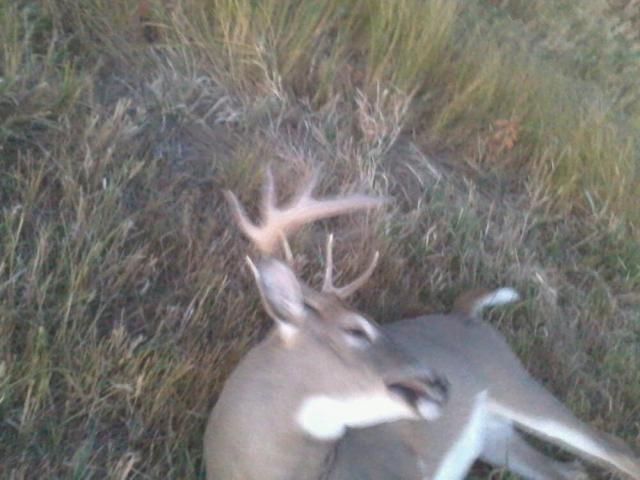I would be prepared to see a lot of dead deer during pheasant season. Hopefully your dogs don't get distracted and kids grossed out by half eaten carcasses.
http://gfp.sd.gov/news/news/september/19.aspx
GFP News - September 19, 2012
Deer Licenses Reduced, Refunds Offered Due to Die-Offs
PIERRE, S.D. - The South Dakota Game, Fish and Parks Department has been monitoring die-offs of white-tailed deer across portions of the state and must make adjustments to some West River deer hunting units.
Epizootic Hemorrhagic Disease (EHD) has been confirmed in white-tailed deer, and many of the deer deaths being reported by the public are suspected to be the result of that disease.
In response to the disease, all unsold licenses will be removed from the following deer hunting units for the West River deer season: Bennett County: 11A-09 and 11B-17; Gregory County: 30A-19 and 30B-19; and Jackson County: 39B-09. In addition, 200 licenses will be removed for Meade County: 49B-09.
"As the department continues to monitor the outbreak of EHD over the next couple of weeks, we will provide additional recommendations to the Game, Fish and Parks Commission at its October meeting to address East River deer units," said GFP Secretary Jeff Vonk. "Currently, the department plans to recommend that the commission remove all unsold licenses in Bon Homme, Hutchinson, and Yankton counties and make significant reductions to leftover licenses in Brule and Charles Mix counties for the second draw of the East River deer season. Between now and the next commission meeting, we will continue our surveillance efforts with the possibility of additional license reductions."
Aside from conducting ground surveillance and collecting reports from the public, GFP is also using aerial flights to help determine the severity of deer mortalities.
"Reports of dead deer are coming from across the state, and in some instances landowners are telling traditionally hosted hunters that opportunities will be limited," Vonk said. "With that in mind, GFP is notifying deer hunters that they can voluntarily return a deer license for any season prior to the start of that respective season and receive a full refund."
Hunters desiring a refund for a deer license should send their license, including all associated tags, to: GFP Licensing Office; 20641 SD Highway 1806; Fort Pierre, SD 57532.
EHD is common in white-tailed deer and is typically detected in late summer or early fall. The virus is spread by a biting midge and causes extensive internal hemorrhaging. Many deer exhibit no clinical signs and appear perfectly healthy, while others may have symptoms such as respiratory distress, fever, and swelling of the tongue. With highly virulent strains of the virus, deer can be dead within 1-3 days. In an attempt to combat the high fever, affected deer are often found in low-lying areas or near rivers, ponds and other waters.
GFP continues to ask individuals who see sick deer or find dead deer to contact their local conservation officer or call the Pierre office at 605-773-5913.
EHD is not infectious to humans. For more information on the EHD virus visit http://gfp.sd.gov/wildlife/diseases/epizootic-hemorrhagic-disease.aspx.
--GFP--
http://gfp.sd.gov/news/news/september/19.aspx
GFP News - September 19, 2012
Deer Licenses Reduced, Refunds Offered Due to Die-Offs
PIERRE, S.D. - The South Dakota Game, Fish and Parks Department has been monitoring die-offs of white-tailed deer across portions of the state and must make adjustments to some West River deer hunting units.
Epizootic Hemorrhagic Disease (EHD) has been confirmed in white-tailed deer, and many of the deer deaths being reported by the public are suspected to be the result of that disease.
In response to the disease, all unsold licenses will be removed from the following deer hunting units for the West River deer season: Bennett County: 11A-09 and 11B-17; Gregory County: 30A-19 and 30B-19; and Jackson County: 39B-09. In addition, 200 licenses will be removed for Meade County: 49B-09.
"As the department continues to monitor the outbreak of EHD over the next couple of weeks, we will provide additional recommendations to the Game, Fish and Parks Commission at its October meeting to address East River deer units," said GFP Secretary Jeff Vonk. "Currently, the department plans to recommend that the commission remove all unsold licenses in Bon Homme, Hutchinson, and Yankton counties and make significant reductions to leftover licenses in Brule and Charles Mix counties for the second draw of the East River deer season. Between now and the next commission meeting, we will continue our surveillance efforts with the possibility of additional license reductions."
Aside from conducting ground surveillance and collecting reports from the public, GFP is also using aerial flights to help determine the severity of deer mortalities.
"Reports of dead deer are coming from across the state, and in some instances landowners are telling traditionally hosted hunters that opportunities will be limited," Vonk said. "With that in mind, GFP is notifying deer hunters that they can voluntarily return a deer license for any season prior to the start of that respective season and receive a full refund."
Hunters desiring a refund for a deer license should send their license, including all associated tags, to: GFP Licensing Office; 20641 SD Highway 1806; Fort Pierre, SD 57532.
EHD is common in white-tailed deer and is typically detected in late summer or early fall. The virus is spread by a biting midge and causes extensive internal hemorrhaging. Many deer exhibit no clinical signs and appear perfectly healthy, while others may have symptoms such as respiratory distress, fever, and swelling of the tongue. With highly virulent strains of the virus, deer can be dead within 1-3 days. In an attempt to combat the high fever, affected deer are often found in low-lying areas or near rivers, ponds and other waters.
GFP continues to ask individuals who see sick deer or find dead deer to contact their local conservation officer or call the Pierre office at 605-773-5913.
EHD is not infectious to humans. For more information on the EHD virus visit http://gfp.sd.gov/wildlife/diseases/epizootic-hemorrhagic-disease.aspx.
--GFP--

